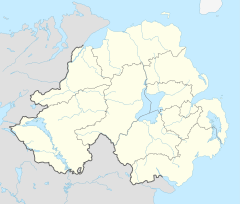Caledon, County Tyrone
Caledon
|
|
|---|---|
 |
|
| Caledon shown within Northern Ireland | |
| Population | 387 (2001 Census) |
| Irish grid reference | H755453 |
| District | |
| County | |
| Country | Northern Ireland |
| Sovereign state | United Kingdom |
| Post town | CALEDON |
| Postcode district | BT68 |
| Dialling code | 028 |
| EU Parliament | Northern Ireland |
| UK Parliament | |
| NI Assembly | |
Caledon /ˈkælᵻdᵻn/, historically known as Kinnaird (Irish: Cionn Aird (head/top of the height or hill)) is a small village and townland (of 232 acres) in County Tyrone, Northern Ireland. It is in the Clogher Valley on the banks of the River Blackwater, 7 miles from Armagh. It lies in the southeast of Tyrone and near the borders of County Armagh and County Monaghan. It is situated in the historic barony of Dungannon Lower and the civil parish of Aghaloo.In the 2001 Census it had a population of 387 people. It is a designated conservation area.
The name Caledon appears to be a shortened version of Caledonia, the old Latin name for Scotland. Originating from the Pictish tribe of northern Scotland, the Caledonii, the term means "great, hard/tough people".
The old settlement of Kinard was burned in 1608 by the forces of Sir Cahir O'Doherty during O'Doherty's Rebellion. Sir Henry Óg O'Neill, the main local landowner, was killed by the rebels.
Caledon House was built in 1779 by James Alexander, a member of the Irish House of Commons for Londonderry, who had previously in 1778 bought the Caledon Estate. James Alexander was made Baron Caledon in 1790 and later Viscount Caledon in 1797. The House was begun in 1779 to designs by Thomas Cooley, but altered by John Nash in 1808-10.
...
Wikipedia

